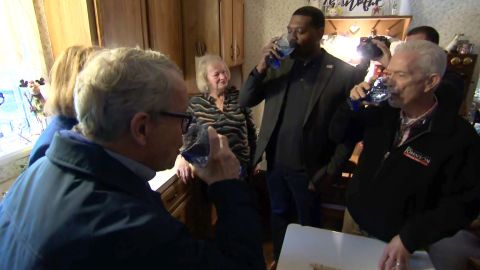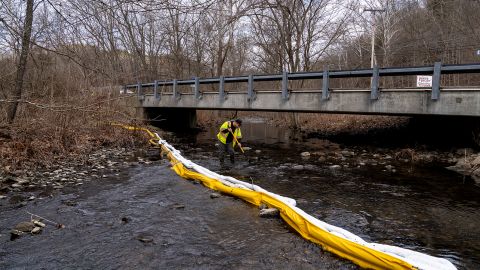Ohio governor drinks the tap water as the EPA demands Norfolk Southern manage all cleanup of a toxic train wreck – or face consequences
CNN — The US Environmental Protection Agency is ordering Norfolk Southern to handle and pay for all necessary cleanup after a train carrying toxic chemicals derailed in East Palestine, Ohio.
The EPA announced its legally binding order Tuesday, 18 days after the freight train derailed. The disaster ignited a dayslong inferno, shot plumes of black smoke into the air and led to the intentional release of vinyl chloride to help avert a more catastrophic blast.
Some residents have reported health problems, and about 3,500 fish have died in Ohio waterways since the wreck.
“Norfolk Southern will pay for cleaning the mess that they created and the trauma that they inflicted on this community,” EPA Administrator Michael Regan said Tuesday.
As part of the EPA’s legally binding order, Norfolk Southern will be required to:
• Identify and clean up any contaminated soil and water resources,
• Reimburse the EPA for cleaning services to be offered to residents and businesses to provide an additional layer of reassurance, which will be conducted by EPA staff and contractors,
• Attend and participate in public meetings at the EPA’s request and post information online, and
• Pay for the EPA’s costs for work performed under the order.
The order will take effect Thursday. The EPA said it will exercise its strongest authority against the train’s operator under CERCLA – the Comprehensive Environmental Response, Compensation, and Liability Act.
“In no way, shape or form will Norfolk Southern get off the hook for the mess that they created,” Regan said.
If the rail company fails to meet the demands, the EPA said it will immediately step in, conduct the necessary work and then seek to compel Norfolk Southern to pay triple the cost.
In response to the EPA’s announcement, Norfolk Southern said it has been working to clean up the site and will continue helping residents.
“We recognize that we have a responsibility, and we have committed to doing what’s right for the residents of East Palestine,” Norfolk Southern said in a statement to CNN.
“We have been paying for the clean-up activities to date and will continue to do so. We are committed to thoroughly and safely cleaning the site, and we are reimbursing residents for the disruption this has caused in their lives. We are investing in helping East Palestine thrive for the long-term, and we will continue to be in the community for as long as it takes. We are going to learn from this terrible accident and work with regulators and elected officials to improve railroad safety.”
The governor and the EPA chief toast with tap water

Hours before the EPA’s announcement, Regan and Gov. Mike DeWine visited an East Palestine home and tried to reassure residents that the municipal water supply is safe.
They raised two glasses filled with water straight from the tap and toasted before drinking.
The municipal water supply comes from five wells deep underground that are encased in steel, state officials have said. But residents with private well water should get that water tested before using it, since that water may be sourced closer to the ground’s surface.
“State and local authorities will continue the water sampling efforts, and EPA will continue indoor air screenings to residents within the evacuation zone,” Regan said Tuesday.
But “I recognize that no matter how much data we collect or provide, it will not be enough to completely reassure everybody,” the EPA chief said.
“It may not be enough to restore the sense of safety and security that this community once had. But we’re going to work together, day by day, for as long as it takes to make sure that this community feels at home once again.”
Contaminated soil lingers in East Palestine
The soil under the railroad track at the site of the wreck is still contaminated, and the tracks need to be lifted to remove that soil, the director of Ohio’s Environmental Protection Agency said Tuesday.
The governor acknowledged residents’ concerns about the contaminated soil and said 4,588 cubic yards of soil and 1.1 million gallons of contaminated water have been removed from East Palestine.
“The railroad got the tracks back on and started running and the soil under the tracks had not been dealt with,” DeWine said. “The tracks will have to be taken up, and that soil will have to be removed.”
Ohio opens a new health clinic in East Palestine
To address the growing reports of rashes, headaches, nausea and other symptoms in East Palestine, the state opened a new health clinic for residents.
The health clinic will have registered nurses, mental health specialists and – at times – a toxicologist, the Ohio Department of Health said.
Medical teams from the US Centers for Diseases Control and Prevention and the US Department of Health are expected to arrive in the community as early as this week to help assess what dangers might remain.
Authorities have repeatedly assured residents that the air and municipal water supply in the town are safe. Crews have checked hundreds of homes and have not detected any dangerous levels of contaminants, the EPA said.
Still, life in East Palestine has been uprooted as residents question the findings and wonder whether it’s really safe to drink the water or breathe the air.
“It will be important to monitor people’s health and the environment around the train derailment for some time to come since health impacts may not emerge until later,” said Dr. Erin Haynes, an environmental health scientist at the University of Kentucky.
“We should never say we’re done looking at this community for potential exposures and health impacts.”
Water intakes in other cities temporarily shut off amid contamination concerns

Some waterways were contaminated after the crash, killing an estimated 3,500 fish. But officials have said they believe those contaminants have been contained.
Norfolk Southern installed booms and dams to restrict the flow of contaminated water from Sulphur Run and Leslie Run – two streams where fish were found dead, the EPA said.
“The spill did flow to the Ohio River during that initial slug, but the Ohio River is very large, and it’s a water body that’s able to dilute the pollutants pretty quickly,” Ohio Environmental Protection Agency official Tiffani Kavalec said last week.
Kavalec said the agency is pretty confident that the “low levels” of contaminants that remain are not getting passed on to water customers.
A series of pumps have been placed upstream to reroute Sulphur Run around the derailment site, Norfolk Southern said Monday.
“Environmental teams are treating the impacted portions of Sulphur Run with booms, aeration, and carbon filtration units,” Norfolk Southern added. “Those teams are also working with stream experts to collect soil and groundwater samples to develop a comprehensive plan to address any contamination that remains in the stream banks and sediment.”
Water intakes from the Ohio River that were shut off Sunday “as a precautionary measure” were reopened after sampling found “no detections of the specific chemicals from the train derailment,” the Greater Cincinnati Water Works and Northern Kentucky Water District said Monday.
A third utility provider – Maysville utility in Kentucky – announced that it temporarily shut off water intakes from the Ohio River on Saturday, when the toxic chemicals released into the river from the derailment were expected to arrive at the water treatment intake in Kentucky, utility general manager Mark Julian said.
Water measurements have been below the level of concern, Julian said, and Maysville took precautionary measures in temporarily shutting down their Ohio River intake valve due to the public concern.
“The takeaway is that anyone along the Ohio River where the contaminants made their way can breathe a sigh of relief,” he said.

Meanwhile, the majority of the hazardous rail cars remain at the crash site as investigators continue to probe the wreck. But about 15,000 pounds of contaminated soil and 1.1 million gallons of contaminated water have been removed from the scene, Norfolk Southern announced Monday.
The contaminated soil became a point of contention last week after a public document sent to the EPA on February 10 did not list soil removal among completed cleanup activities. It is not yet known what significance or impact the soil that was not removed before the railroad reopened on February 8 will have had on the surrounding areas.
Some East Palestine businesses struggle
As skepticism spreads about the safety of the air and water, some local businesses say they’ve seen fewer customers.
“Everybody’s afraid … They don’t want to come in and drink the water,” Teresa Sprowls, a restaurant owner in East Palestine, told CNN affiliate WOIO.
A stylist at a hair salon told WOIO there’s no doubt the salon lost business and that customers may be worried about what may be in the water washing their hair.
“I know a lot of our businesses are already suffering greatly because people don’t want to come here,” local greenhouse owner Dianna Elzer told CNN affiliate WPXI.
Her husband, Donald Elzer, echoed her concerns, saying, “It’s devastating. The longer it goes on, the worse it gets.”
Dianna Elzer also worried about longer-term economic impacts to the community.
“Our property values – who is going to want to buy a house here now?” she told WPXI. “It’s going to be a long struggle to get back to where we were.”
US transportation chief will visit Ohio … but not now
As residents call for accountability from both Norfolk Southern and government officials, US Transportation Secretary Pete Buttigieg said he plans to visit East Palestine “when the time is right” – but did not announce a date.
He did announce Monday new efforts by the Department of Transportation to improve rail safety.
“We are accelerating and augmenting our ongoing lines of effort on rail regulation and inspection here at the US DOT, including further regulation on high hazard flammable trains and electronically controlled pneumatic brakes – rules that were clawed back under the previous administration – to the full extent of that we are allowed to under current law, and we will continue using resources from the Bipartisan Infrastructure Law to fund projects that improve rail safety,” Buttigieg said.
A DOT news release said the agency will continue to press for the “Train Crew Staffing Rule,” which would require a minimum of two crew members during most railroad operations. Norfolk Southern has opposed the proposed rule.
Norfolk Southern has committed millions of dollars’ worth of financial assistance to East Palestine, including $3.4 million in direct financial assistance to families and a $1 million community assistance fund, among other aid, the company said.
Norfolk Southern CEO Alan Shaw posted an open letter telling East Palestine residents, “I hear you” and “we are here and will stay here for as long as it takes to ensure your safety and to help East Palestine recover and thrive.”
“Together with local health officials,” Shaw said, “we have implemented a comprehensive testing program to ensure the safety of East Palestine’s water, air, and soil.”
Correction: An earlier version of this story misspelled the first name of Ohio Environmental Protection Agency official Tiffani Kavalec.
CNN’s Celina Tebor, Linh Tran, Elizabeth Hartfield, Brenda Goodman, Jen Christensen, Maegan Vazquez, Sabrina Souza and Nicki Brown contributed to this report.


